How often have you complained about your lack of sleep to a coworker, partner, or friend only to be answered with the same two suggestions – melatonin or sleepytime tea? Americans are an exhausted and stressed group: we work hard, balance countless responsibilities on our plates, even more so since the spread of Coronavirus, and hold ourselves accountable for an unimaginable amount of commitments. There are a plethora of new things to worry about, how to keep our loved ones safe from the virus and teach our kids the math we, quite frankly, forgot as soon as we graduated, hoping never to have to use it again. So why is it that when it comes to our rest, we deprioritize our commitment to a good night’s rest?
The reality is, our collective lack of sleep is slowing us down: countless studies publish findings about how sleep deprivation affects our performance. SleepHealth reports that “in America, 70% of adults report that they obtain insufficient sleep at least one night a month, and 11% report insufficient sleep every night.”
Adults who hope to keep up with their daily obligations need a solution that works: for many, CBD has become the answer they were seeking. CBD can help with many areas, but how can it be used to fall asleep? This article will dive into some of the most frequently asked questions about sleep and CBD, and help guide you into establishing a sleep routine that works for you.
CBD for Insomnia: How Does it Work?
Adults who have taken CBD for insomnia have reported waking up feeling more refreshed and ready to take on the day without any of that pesky brain fog in the way of their productivity. Why does this happen? An article on HuffPost cites a study explaining just that:
“These studies mainly point to CBD’s ability to interact with … serotonin receptors and GABA receptors in the brain…Serotonin plays an important role in mood and anxiety, and GABA is known as the main ‘inhibitory’ neurotransmitter, meaning it calms excess activity in the brain and promotes relaxation.”
While studies are still in their early stages, more and more adults are reporting positive results.
How to Use CBD for Sleep
One of the best places to start when evaluating your options to figure out how to use CBD for sleep is understanding which specific issue you have when it comes to sleeping. Whether you have trouble falling asleep or staying asleep throughout the night will help determine a CBD routine that works best for you.
Because CBD’s effectiveness is dependent on your unique bioavailability – aka, how much CBD actually gets absorbed into your bloodstream – when you’re choosing a product, the way you consume it matters! Tree of Life Seeds CBD products for sleep are available as drops, softgels, topicals, as well as chocolates (if you’re of the sweet tooth kind).
If you need help falling asleep – a tincture that you can use to drop CBD oil underneath your tongue will provide the fastest contact with your bloodstream and act the quickest. If you can fall asleep easily but find yourself waking up throughout the night, a CBD chocolate or softgel will take longer to kick into effect and may help keep you snoozing throughout the night’s hours.
Using CBD Oil to Combat Insomnia
You’ll want to establish a routine for taking CBD oil: performing a calming bed-time routine that can include light stretching, meditative exercises, and maybe even an herbal drink will help train your body for recognizing when it’s time to get to bed. From there, you can easily add CBD to your bedtime hygiene ritual by adding it to your skincare routine or pairing a tincture with your favorite tea.
Wondering about CBD and melatonin? The two are practically a match made in heaven. Melatonin is a hormone that, when its levels are high, can promote the regulation of the body’s circadian rhythm and sleep-wake cycle. CBD complements the hormone by helping the body achieve a state of homeostasis throughout its various systems. An article by TheAlchemistKitchen writes that “melatonin and CBD together can help to rebalance and restore the body to its natural rhythm to help sleep better with CBD’s gentle, plant-based power.”
After you’ve established a combination of CBD products, natural supplements, and routine that works for your lifestyle – remember to be a little patient. If you’re new to using CBD, it might take your body a few weeks to fully feel the benefits.








0 Comments